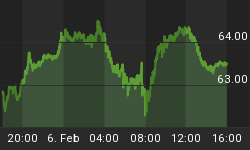Jerry del Missier, co-chief executive officer of Barclays Capital, spoke to Bloomberg TV's Trish Regan and Adam Johnson today. Del Missier said that the sovereign debt crisis in Europe will take "years to play out" and that the Volcker Rule could "significantly dislocate" some markets for Barclays.
On what's next for the banking sector:
"You have to take a step back and look at where we were in late 2011. We spent virtually the entire fourth quarter on the edge of a precipice and I think that what you saw was excess pessimism built into the system. Now what you've seen is that excess risk premium getting taken out of the market. There clearly needs to be a recapitalization of the system. I think that you're going to see sale of businesses, sale of assets. All of this is going on at the same time that we're going through a pretty significant regulatory overhaul as well. Even though things have come back significantly for the continental banks, there are still challenges."
On the effect of the Volcker Rule:
"There's a lot of concern about the Volcker rule and the way it's been proposed. It gets at the very essence of the market's ability to function, particularly the credit markets. The corporate bond market is right in the middle of the bull's-eye, of where the rule has the biggest effect on the ability of banks to make markets and provide liquidity for institutions -- ultimately, affecting the ability of corporate to access the corporate bond market."
On Volcker's impact on Barclays Capital:
"A lot of it depends, ultimately, on how markets evolve. You've seen the studies from the likes of Oliver Wyman predicting tens of billions ultimately borne by the institutions and by borrowers. When you get down to what does it means as an institution, it gets a little bit harder. But, clearly, we would expect that certain markets would have the risk of potentially being significantly dislocated."
On Occupy Wall Street:
"We've been through a very difficult period. A lot of people have been hurt. These are emotionally charged issues. You can understand why there's a desire to try to fix the system. I think that the important thing is to really take a step back and understand what's net impact is in what we are doing here and how it will impact -- not just banks and intermediaries functioning in the markets -- but the very markets themselves, which are ultimately responsible for allowing companies to access financing and capital, and all of the things that are critical for job creation."
"Look, we're all in this together. We all want to see a strong economy and efficient, transparent, estate markets. No one wants to go back to where we were five years ago."
On the debt deal in Greece:
"We have to recognize the challenges that Europe is facing are profound and will play themselves out over a long period of time, but clearly the news out of Greece is very welcome. When you add that to the terrific results from the long-term repo operations and the financing the ECB has done, that's taken a lot of that financing risk of the table, then I think certainly, this phase of the crisis is behind us. They bought some time for the European economies to find their legs and for the politicians to do the difficult work of restructuring their fiscal situation."
"If you look at what needs to happen, you need to see a significant deleveraging at the sovereign level. You have a financial system that also needs to be deleverage or recapitalize. All in an environment where there aren't clear rules, where there isn't a central fiscal authority, where every decision becomes a major political event, and at the same time that the economies are borderline in recession. This will take years to play itself out."
On how sovereigns can de-leverage without growth:
"You're starting to see this whole notion of the balance of growth versus austerity. Clearly, a lot of the austerity needs to happen in the form of structural reform that plays itself out over years, but it can't be done at the expense of having an overly tight monetary or a currency that's over-valued. They need to sort of figure out a way to give the southern European economies in particular a little bit of stimulus in growth. Certainly, the fact that the U.S. economy is now showing signs of renewed strength will help in that situation."
"Growth is a good thing for the world right now. Looking at the last few years, the periods that Europe has been in more difficulty have, not coincidentally, happened at the same time the U.S. economy has slowed down. This notion of making sure that somewhere in the world we've got growth, that's a positive forward for Europe and their ability to work through this."
On Europe:
"I differentiate Greece from the other countries. What's important in a place like Portugal and Spain, notwithstanding the fact that they have real challenges, like popularly elected government with a mandate to drive change, and Italy, even though Prime Minister Monti does not have the popular mandate of his peers in Portugal and Spain...Monti has set about doing the kind of long-term structural reform. Clearly, they're not going to get away without having pain. When you are talking about restructuring labor markets, it's going to be a period of pain. We shouldn't lose sight of the fact that in places like Italy, you do have a vibrant export sector. The north of Italy has a very strong small-business economy and would benefit from a weaker euro, would benefit from lower rates, and certainly the trade with China and the other high- growth economies would be one avenue for growth. But, I think we are in for a period of low growth at best in Europe, even if all of those things go well."















